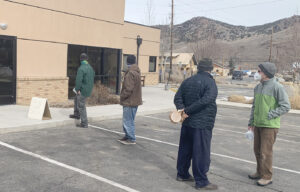 by Samar Fay
by Samar Fay
Hungry people may not be visible in a rural mountain town where cold, snowy winters drive most of the homeless to more gentle climates. But there is a chronic need for food assistance, which has only increased since COVID-19 threw so many people out of work.
Chaffee County is in central Colorado, 1,000 square miles traversed by the Arkansas River, inhabited by 20,000 people, with one city of 6,000 people, Salida, and two smaller towns. According to the US Census Bureau, the median household income in 2019 was $46,875, with 13 percent of the people living in poverty.
There is a patchwork of programs that address the problem of hunger in Chaffee County. Several of them are aimed at the senior population. Meals on Wheels, not income-based but free to people 60 and older who are housebound and can’t cook, uses the kitchen at the Episcopal Church of the Ascension to prepare hot food delivered three days a week to about 100 people, and grab and go meals are available at the church for 10 to 15 people. They used to come into the church undercroft for congregate meals and social time, but this has been suspended during the COVID-19 pandemic.
The Salida Community Center is an outlet for two USDA commodity food programs, providing monthly assistance for seniors and low-income residents who meet program income limits. Before COVID, they helped 200 to 300 people a month, but since the pandemic, they find more than 800 people lining up to receive boxes of food.
Caring and Sharing, a local center for selling donated goods, an elderly daycare, and a wintertime homeless shelter, also hosts an emergency assistance food bank that can give one or two days’ worth of food donated by a local supermarket and community members. About 25 people a day request this assistance. They also operate a soup kitchen five days a week that serves about 30 people. About half the people in the day care are elderly and half are homeless people.
First Presbyterian Church operates the Stone Soup Café, which provides soups to anyone in the community every Monday at noon. In place of the former gatherings around tables, people are admitted one at a time to receive to-go containers. Their Food Pantry is open Thursday afternoons for drive-up service. Volunteers prepare boxes of staples intended for two people and add more boxes if the household is bigger.
School children have a special benefit generated by the pandemic. All students who have chosen to attend in-person classes receive free breakfast and lunch, since the USDA extended the Summer Food Service Program through the rest of the school year. About 550 students currently eat at school (although this may change if in-person classes are closed again). The 160 or so who chose remote learning are on their own at home.
Finally, Chaffee County has a nonprofit, non-denominational food bank, The Grainery Ministries. For about 25 years The Grainery has been distributing food, no questions asked, as well as referrals to other services, listening support, and prayer as requested. It is open Mondays and Fridays for clients to fill their box with their choice of the groceries on the shelves. Compared to handing out pre-filled boxes, they believe this is more dignified for the clients and results in less food wasted. Clients can visit The Grainery as often as every two weeks.
All the funding is from donations and grants. The work is done by about 10 volunteers.
Since COVID showed up, there have been changes at The Grainery. To protect the volunteers as much as the clients, masks are required for everyone, clients come in one at a time, and surfaces are sanitized between clients. The volunteers are trained to maintain safe distances and are no longer allowed to linger and chat with each client.
“Our volunteers are all seniors,” said co-manager Sharon Surdez. “We’re really cautious with them. We’re not taking any new ones just now.”
The number of boxes being given out at The Grainery has dropped somewhat in the last year, although the food supply has actually increased. According to Surdez, they used to average more than 500 boxes a month, but weren’t up to that number in January. They gave 335 families holiday meals at Thanksgiving.
“Personally, I think people are a little afraid,” Surdez said. She regrets not being able to talk with clients as much as she used to, and not getting as acquainted with new people.
She said churches have been wonderful, helping financially and supplying faithful volunteers.
“We really want to stay open. We try to meet individual needs. We don’t ask questions,” Surdez said.
The Grainery Food Bank is open Mondays and Fridays in Salida, Colorado, serving about 500 boxes of food each month.
